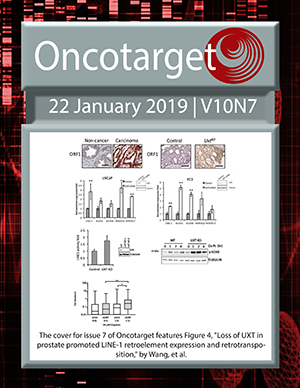A novel combined targeted therapy with bromodomain antagonist and MEK inhibitor in anaplastic thyroid cancer
A novel combined targeted therapy with bromodomain antagonist and MEK inhibitor in anaplastic thyroid cancer |
|
https://doi.org/10.18632/oncotarget.26591
Carmelo Nucera
|
| 686-687 |
Pro-tumorigenic non-pump function of sodium iodide symporter: A reimagined Trojan horse?
Pro-tumorigenic non-pump function of sodium iodide symporter: A reimagined Trojan horse? |
|
https://doi.org/10.18632/oncotarget.26596
Fang Feng,
Lamis Yehia,
and Charis Eng
|
| 688-689 |
PARP6 inhibition as a strategy to exploit centrosome clustering in cancer cells?
PARP6 inhibition as a strategy to exploit centrosome clustering in cancer cells? |
|
https://doi.org/10.18632/oncotarget.26599
Zebin Wang,
Shaun E. Grosskurth,
and Huawei Chen
|
| 690-691 |
Systems proteogenomics for precision oncology
Systems proteogenomics for precision oncology |
|
https://doi.org/10.18632/oncotarget.26601
Frederick Klauschen
|
| 692-693 |
Personalised surveillance after treatment for high-risk cancer
Personalised surveillance after treatment for high-risk cancer |
|
https://doi.org/10.18632/oncotarget.26619
Christina Guo,
Jeremy Lewin,
and Mark Shackleton
|
| 694-695 |
Can we predict long-term survival in resectable pancreatic ductal adenocarcinoma?
Can we predict long-term survival in resectable pancreatic ductal adenocarcinoma? |
|
https://doi.org/10.18632/oncotarget.26511
Tamara M.H. Gall,
Gareth Gerrard,
Adam E. Frampton,
Leandro Castellano,
Raida Ahmad,
Nagy Habib,
Duncan Spalding,
Madhava Pai,
Letizia Foroni,
and Long R. Jiao
|
| 696-706 |
Prostate-specific loss of UXT promotes cancer progression
Prostate-specific loss of UXT promotes cancer progression |
|
https://doi.org/10.18632/oncotarget.26573
Yu Wang,
Eric D. Schafler,
Phillip A. Thomas,
Susan Ha,
Gregory David,
Emily Adney,
Michael J. Garabedian,
Peng Lee,
and Susan K. Logan
|
| 707-716 |
High CXCR4 expression impairs rituximab response and the prognosis of R-CHOP-treated diffuse large B-cell lymphoma patients
High CXCR4 expression impairs rituximab response and the prognosis of R-CHOP-treated diffuse large B-cell lymphoma patients |
|
https://doi.org/10.18632/oncotarget.26588
Maria Bach Laursen,
Linn Reinholdtz,
Anna Amanda Schönherz,
Hanne Due,
Ditte Starberg Jespersen,
Lykke Grubach,
Marianne Schmidt Ettrup,
Rasmus Røge,
Steffen Falgreen,
Suzette Sørensen,
Julie Støve Bødker,
Alexander Schmitz,
Hans E. Johnsen,
Martin Bøgsted,
and Karen Dybkær
|
| 717-731 |
Poor overall survival in hyperhaploid multiple myeloma is defined by double-hit bi-allelic inactivation of TP53
Poor overall survival in hyperhaploid multiple myeloma is defined by double-hit bi-allelic inactivation of TP53 |
|
https://doi.org/10.18632/oncotarget.26589
Cody Ashby,
Ruslana G. Tytarenko,
Yan Wang,
Niels Weinhold,
Sarah K. Johnson,
Michael Bauer,
Christopher P. Wardell,
Carolina Schinke,
Sharmilan Thanendrarajan,
Mauricio Zangari,
Frits van Rhee,
Faith E. Davies,
Jeffrey R. Sawyer,
Gareth J. Morgan,
and Brian A. Walker
|
| 732-737 |
Contribution of MSMB promoter region gene polymorphism to early-onset prostate cancer risk in Mexican males
Contribution of MSMB promoter region gene polymorphism to early-onset prostate cancer risk in Mexican males |
|
https://doi.org/10.18632/oncotarget.26592
Silvia Juliana Trujillo-Cáceres,
Luisa Torres-Sánchez,
Ana I. Burguete-García,
Yaneth Citlalli Orbe Orihuela,
Ruth Argelia Vázquez-Salas,
Esmeralda Álvarez-Topete,
and Rocío Gómez
|
| 738-748 |
AMPK activation by AICAR sensitizes prostate cancer cells to radiotherapy
AMPK activation by AICAR sensitizes prostate cancer cells to radiotherapy |
|
https://doi.org/10.18632/oncotarget.26598
Colin Rae,
and Robert J. Mairs
|
| 749-759 |
Immunonutritional consequences of different serine-type protease inhibitors in a C57BL/6 hepatocarcinoma model
Immunonutritional consequences of different serine-type protease inhibitors in a C57BL/6 hepatocarcinoma model |
|
https://doi.org/10.18632/oncotarget.26605
Jose Laparra,
Bartosz Fotschki,
and Claudia Haros
|
| 760-772 |
ALT cancer cells are specifically sensitive to lysine acetyl transferase inhibition
ALT cancer cells are specifically sensitive to lysine acetyl transferase inhibition |
|
https://doi.org/10.18632/oncotarget.26616
Dalal Bakhos-Douaihy,
Chantal Desmaze,
Maya Jeitany,
Laurent R. Gauthier,
Denis Biard,
Marie-Pierre Junier,
Hervé Chneiweiss,
and François D. Boussin
|
| 773-784 |
Emerging approaches to study cell–cell interactions in tumor microenvironment
Emerging approaches to study cell–cell interactions in tumor microenvironment |
|
https://doi.org/10.18632/oncotarget.26585
Nao Nishida-Aoki,
and Taranjit S. Gujral
|
| 785-797 |
Correction: Long non-coding RNAs could act as vectors for paternal heredity of high fat diet-induced obesity
Correction: Long non-coding RNAs could act as vectors for paternal heredity of high fat diet-induced obesity |
|
https://doi.org/10.18632/oncotarget.26635
Tian An,
Teng Zhang,
Fei Teng,
Jia-Cheng Zuo,
Yan-Yun Pan,
Yu-Fei Liu,
Jia-Nan Miao,
Yu-Jie Gu,
Na Yu,
Dan-Dan Zhao,
Fang-Fang Mo,
Si-Hua Gao,
and Guangjian Jiang
|
| 798-798 |
Correction: The role of AP-1 in self-sufficient proliferation and migration of cancer cells and its potential impact on an autocrine/paracrine loop
Correction: The role of AP-1 in self-sufficient proliferation and migration of cancer cells and its potential impact on an autocrine/paracrine loop |
|
https://doi.org/10.18632/oncotarget.26636
Sherif Abd El-Fattah Ibrahim,
Aierken Abudu,
Eugenia Johnson,
Neelum Aftab,
Susan Conrad,
and Michele Fluck
|
| 799-799 |




